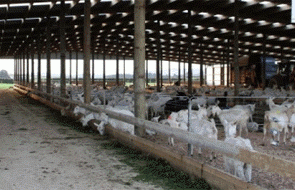
Content supplied by DairyNZ
Investing in a wintering barn may feel good for the farmer but it won’t necessarily be profitable, according to a DairyNZ study.
DairyNZ senior economist Matthew Newman and AgFirst consultant Phil Journeaux, presented the interim results of the study to a conference in Rotorua today, indicating that the jury is still out on whether investing in a wintering barn is a good financial or environmental move.
The paper presented to the Australian Agricultural and Resource Economics Society’s annual (AARES) conference is based on analysis of a selection of five South Island farms with free stall barns.
It shows inclusion of a barn without intensification of the farming system may reduce nitrogen losses, but at a significant cost.
With good management and intensifying the farming system, the investment in a barn can be profitable but this is dependent on the milk price, feed costs and initial capital outlay, the study finds.
Intensifying the farm system to make the barn profitable often erodes the environmental benefits.
“Overall, the decision around a barn tends to be either/or - either you make money out of it or you reduce the environmental footprint of the farm. It is difficult to achieve both,” says Matthew Newman.
The study showed the farmers generally invested in wintering barns for farm management reasons such as reducing pugging of paddocks, better utilisation of supplementary feed, better control of grazing management and feeding, shelter for stock during adverse weather, better working conditions and to reduce the cost of wintering cows off over the winter. Financial and environmental considerations were well down the list.
For most farms, there was a significant capital cost associated with the barn; more/new machinery and spending on other farm infrastructure. However, the cost of similar barns varied significantly.
“Incorporating a barn changes the system and most of the farmers in the study were taking two to three years to adjust the system to a level they felt was appropriate. They require a change in management and often more attention to detail, particularly around nutrition,” says Matthew.
In general, farmers with barns were trading some of their climatic risks for financial risks, particularly servicing increased borrowings and sourcing appropriate supplementary feed, he says.
How was the study carried out?
• Data was collected from five South Island farms running free stall barn systems, two in Southland and three in Canterbury. Once the preliminary analysis was done, the farms were re-visited to check on the assumptions made and data used.
• The financial analysis used an investment cost-benefit approach calculating the Net Present Value and Internal Rate of Return over a 20-year cash flow, using a base discount rate of 8% real. The base milk price used was $6.50 per kilogramme of milksolids.
• Three of the five farms had a positive Internal Rate of Return but only one had a positive Net Present Value, meeting the 8 percent discount rate.
• The analysis involved consideration of the capital costs involved, increased operating costs, offset by a reduction in some costs (e.g. less fertiliser) and increased milk solids production. In most cases the advent of the barn resulted in increased cow numbers and increased supplementary feeding levels.
• Stage two of the study on the economic and nutrient loss impacts of constructing and running cow housing facilities will include a further nine Waikato barns.
• A final report with full results from the study will be completed at the end of March 2015.
We welcome your comments below. If you are not already registered, please register to comment
Remember we welcome robust, respectful and insightful debate. We don't welcome abusive or defamatory comments and will de-register those repeatedly making such comments. Our current comment policy is here.